How to Clear Cache in Windows 11/10
First, let us take a look at what is cache files. Cache files are temporary files generated when you use the system and applications.
The cache is the buffer for data exchange. When the hardware reads the data, it will generally look for the desired data in the cache first, and if it cannot find it, it will look for it in the memory. For example, you have used chrome to find information, and the next time you open the browser to query similar content, the search box will automatically fill in the data.
However, too many temp files will become a drag for computer performance.
So what does clear cache mean? Clearing cache files will increase the speed of the computer, free up disk space, and more. If your computer gets freeze randomly, try the fixes now.
QUICK FIXES:
1. Clear System Cache with Qiling CleanGenius
2. Clear Browser Cache in Windows 10 (Chrome/Internet Explorer/Edge/Firefox)
3. Clear Temp Files of Settings
4. How to Clear DNS Cache in Windows 10 via CMD
5. Run Disk Cleanup to Clear Cache
6. Clear Cache in Microsoft Store
Extra Tip: Optimize Your SSD Performance With 4K Alignment Software
1. Clear System Cache with Qiling CleanGenius
How to delete cache files with simple steps? We'd like to share a straightforward cleanup tool with you. Follow the steps to wipe the system cache in 1 click.
Step 1. Download and install Qiling Partition Master Suite on your PC. Click to download PC Cleaner on panel.
Step 2. Install Qiling CleanGenius on your PC. To begin with, navigate to "Cleanup" and click "Scan."
Step 3. Qiling CleanGenius will start immediately to scan all the useless files, select system junk files and invalid entries, and click "Clean" over all your PC.
Step 4. Once completed, you can see clearly how many MBs or GBs of data are cleaned. Click "Done" to finish the process.
2. Clear Browser Cache in Windows 11/10 (Chrome/Internet Explorer/Edge/Firefox)
Want to clear cache files in Chrome/Internet Explorer/Edge/Firefox? In this part, check the browser you are using and apply the steps to remove unnecessary data.
1 - Clear Cache Files in Chrome
Step 1. Open Chrome Browser on computer.
Step 2. Click More at the top right corner.
Step 3. Choose "More tools" > Click "browsing data"
Step 4. On the Clear browsing data window, choose a time range. If you prefer to delete all, choose All Time.
Step 5. Check "Cookies and other site data" and "Cached images and files".
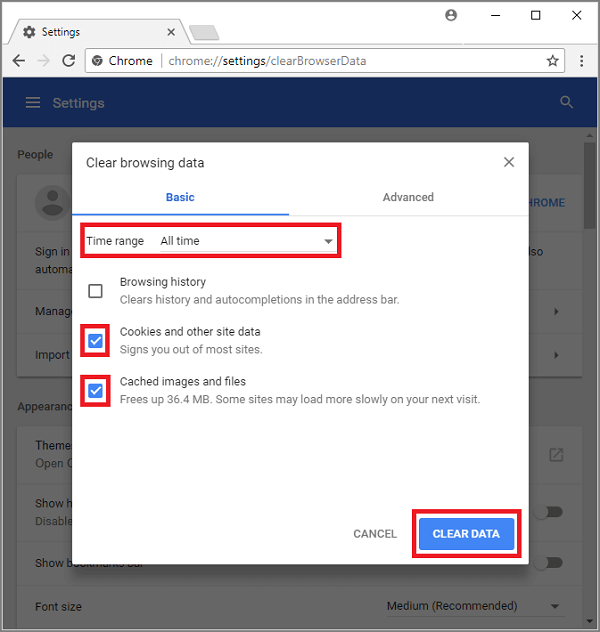
Step 6. Click Clear data.
2 - Clear Internet Explorer Cache Files
Step 1. Run Internet Explorer.
Step 2. Choose the tool menu or gear icon at the upper right corner.
Step 3. Click "Internet Options" in the drop-down menu.
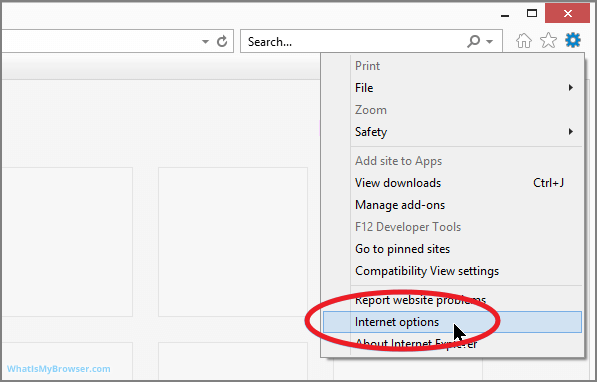
Step 4. Then the Internet Options window pops up, you can click the "General" tab.
Step 5. Go to the "Browsing History" section and click the "Delete" button.
Step 6. On the "Delete Browsing History" window, Check "Preserve Favorites website data"(Optional), "Temporary Internet files and website files", "Cookies and website files", and "History". Then choose "Delete".

3 - Clear Microsoft Edge Cache Files in Windows 10
Step 1. Click three-dot on the top right corner.
Step 2. In the drop-down menu, click "Settings".
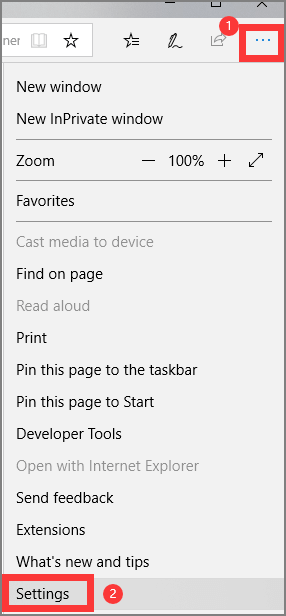
Step 3. Under the "Clear browsing data" section, click "Choose What to Clear".
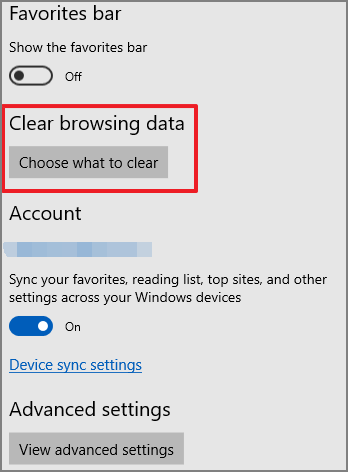
Step 4. You can check a list of checkboxes. Check the one you want to delete.
Step 5. Click the "Clear" button.

4 - Clear Cache Files in Firefox
Step 1. Click the menu button on the top right corner and select "Options" on the drop-down menu.
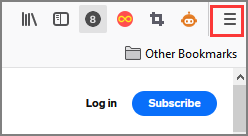
Step 2. Choose "Privacy & Security" on the left panel.
Step 3. Scroll down to find "Cookies and Site Data" section, and check Cached Web Content.
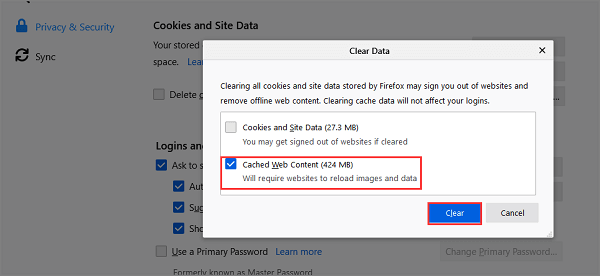
Step 4. Click the "Clear" button.
3. Clear Temp Files of Settings
Step 1. Open Settings > System > Storage > Choose the drive you want to clear cache files.
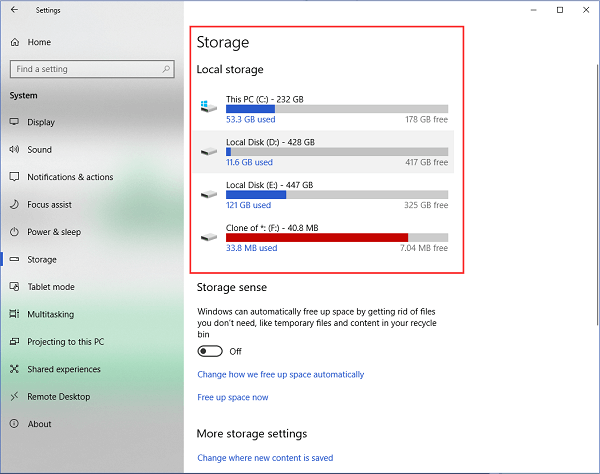
Step 2. Click "Temporary files" > Check temp files (To avoid delete necessary data, read the description of each file type carefully.)

Step 3. Click "Remove Files" button.
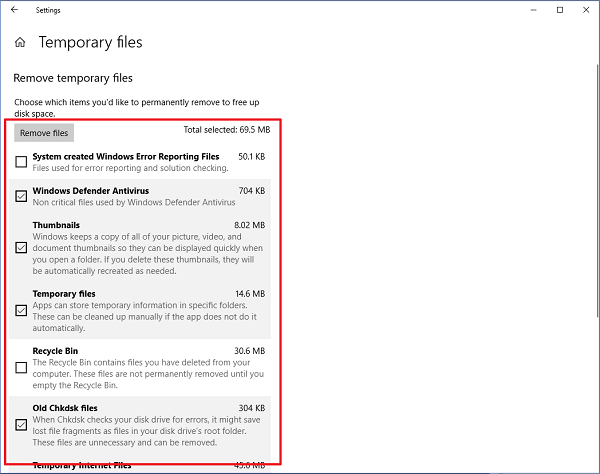
Moreover, you can delete temp files from the default file path. Go to C:\Users\Admin\AppData\Local\Temp and press "Ctrl + A" to wipe temp files.
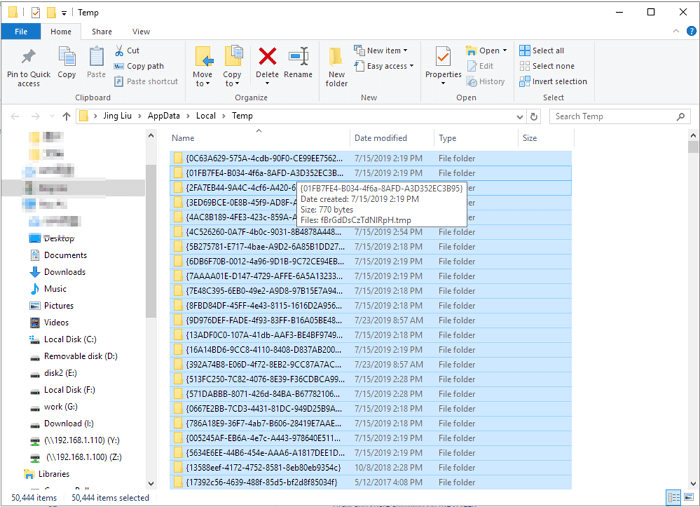
4. How to Clear DNS Cache in Windows 11/10 via CMD
Step 1. Input Command Prompt in the search box. Right-click CMD and choose "Run as Administrator".
Step 2. Type command line: ipconfig / flushdns
Step 3. Press Enter and the message "Successfully flushed the DNS Resolver Cache" will appear.
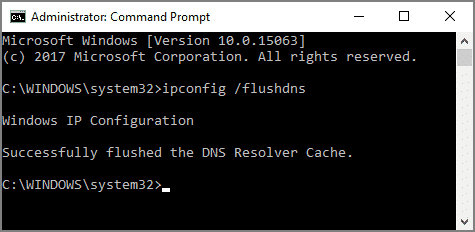
5. Run Disk Cleanup to Clear Cache
Step 1. Type Disk Cleanup on the search box and click to start it. (Or you can press Windows + R to input "cleabmgr.exe" and click OK.)
Step 2. Choose the drive you want to clear cache files. Click "Clean up system files".

Step 3. Check "File to delete" and click OK.
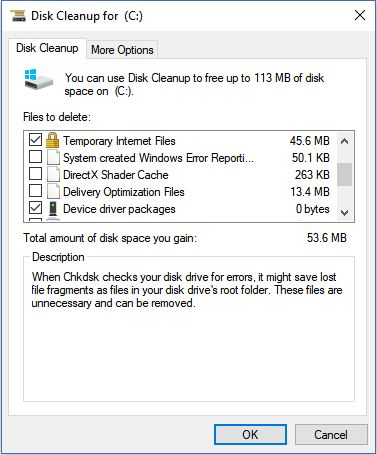
6. Clear Cache in Microsoft Store
You can perform a reset to clear your cache files in Microsoft Store.
Go to Settings > System > Apps & Features > Store > Advanced options > Reset
Extra Tip: Optimize Your SSD Performance With 4K Alignment Software
After you have deleted cache files on your computer, we also recommend disk partition software, Qiling Partition Master, to maximize SSD performance and speed up your PC. The "4K Alignment" feature will allow SSD to read and write data with the fastest speed.
Step 1. Select the SSD disk that you want to align, click it and choose "4K Alignment".
Step 2. Clicking the "OK", then, the SSD drive partitions are all 4K aligned with all sectors on it.
Read also:
Related Articles
- What Is NTFS File System and Do I Need It? [Check The Answer Here]
- How to Fix Windows 11 Antimalware Service Executable High CPU Usage
- Top 5 Reliable Software to Check Hard Disk Health for Free
- Fix the Selected GPT Formatted Disk Partition Not of Type